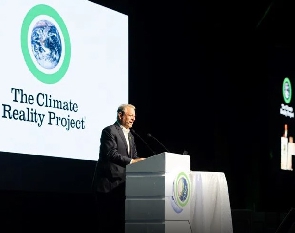 Former US Vice President, Al Gore
Former US Vice President, Al Gore
Former US Vice President, Al Gore, is advocating immediate action to address climate change, stating that the crisis is the “biggest threat” to the global economy’s health.
The COVID-19 pandemic has already caused significant disruptions in the global economy, marking the most significant economic crisis in over a century.
Al Gore cautions that neglecting the climate crisis will exacerbate the damage, particularly affecting emerging economies.
“This crisis is also an extinction and biodiversity crisis, with the threat of extinction for 50 percent of all the living creatures on land that we share this Earth with. So, these consequences of the climate crisis are becoming just unsustainable; it’s also the biggest threat to health of the global economy,” the former US Vice President stated in Accra.
It was his inaugural visit to the country, arriving to spearhead the 54th Climate Reality Leadership Training. This session stands as one of the biggest gatherings in Africa, bringing together scientists, experts and young individuals to delve into the latest climate science, current policies, solutions and chances for advocates to create an impact.
Hunger crisis
Al Gore noted that from 2000 onward, there has been a significant rise in the frequency of days with both high temperature and humidity attributed to climate change. He emphasised that globally, 93 percent of the excess heat generated is absorbed by the oceans. According to him, substantial warming of the oceans has a pronounced effect on overall temperature.
“The heat now goes down to 2000 metres deep, and more than half of all this increase has been in the last 20 years – continuing to increase, and will continue as long as we keep using the sea as an open sewer. This presents two different kinds of threats: war, as well as the threat to fish – with ocean-based storms like cyclones and hurricanes and typhoons much stronger than they used to be,” he stated.
Africa, particularly East Africa, has been hit by quite a number of cyclones in recent years that have killed many people and caused a great deal of property damage.
A second consequence of heating up the oceans, Al Gore explained, is distortion of the water cycle. He said evaporation from the ocean fills the sky with water vapor which falls as rain, and in some places and times as snow.
“This water cycle has been supercharged; we’re putting it on steroids, and the evaporation off the oceans has particularly increased quite dramatically. The warmer air holds far more water vapor, so when this water vapor comes over the land, atmospheric rivers, the downpours become much stronger. Many scientists are calling these downpours rain-bombs; much more moisture falls in a short period of time,” he said.
“And this is contributing to the hunger crisis in some parts of Africa, including some parts of West Africa. This is a human tragedy caused by the climate crisis; food insecurity is already stressed in many areas, reaching crisis and even catastrophic emergency levels in many areas,” he added.
Climate refugees
Al Gore mentioned that the climate crisis puts fresh water supply, food production and global health at risk. In many tropical areas, around 3 billion people are in danger due to a combination of high temperatures and humidity, making their homes physically unbearable. This risk is significant in West Africa – especially Nigeria, which faces a specific threat due to its location and being the most populated country in Africa, he stated.
“It is unbelievable that 323 million people in Nigeria are potentially at risk of being placed in these unlivable conditions. Throughout West Africa, we are seeing the emergence of these conditions that are driving the number of people crossing borders and moving within countries to the tens of millions worldwide. 20,000 children per day have been displaced over the last five years by the climate crisis-fuelled disasters, and the experts predict that in this century, if we do not act, there could be 1 billion climate refugees crossing international borders,” he stated.